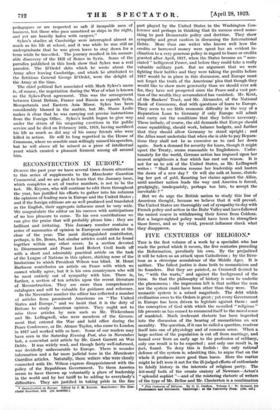RECONSTRUCTION IN EUROPE.*
DURING the past year we have several times drawn attention to this series of supplements to the Manchester Guardian Commercial, and we are glad to learn that the January issue, which completes a set of twelve numbers, is not to be the last. Mr. Keynes, who will continue to edit them throughout the year, has justified his efforts to gather into his columns the opinions of leading men in Europe and the United States ; and if the foreign editions are as well produced and translated as the English, their aggregate influence must be very wide. We congratulate the editor on his success with anticipations of no less pleasure to come. To his own contributions we can give the praise that will probably please him : they are brilliant and irritating. This January number contains a series of summaries of opinion in European countries at the close of the year. The most distinguished contributor, perhaps, is Dr. Benes, but similar articles could not be found together -within any other cover. In a section devoted to Disarmament and Peace Lord Robert Cecil leads off with a short and admirably practical article on the task of the League of Nations in this sphere, shirking none of the limitations to which President Wilson was blind. M. Henri Barbusse contributes an article on Peace with which we cannot wholly agree, but it is his own countrymen who will be most entirely out of sympathy with him. There is, further, a section of ten articles upon the recent literature of Reconstruction. They are more than comprehensive catalogues and will be valuable for guidance and reference.
In the November number the editor has collected a number of articles from prominent Americans on " The United States and Europe," and we insist that it is the duty of Britons to study American opinion. They ought not to miss these articles by men such as Mr. Wickersham and Mr. Leffingwell, who were members of the Govern- ment that entered the War and held office during the Peace Conference, or Dr. Alonzo Taylor, who came to London in 1917 and worked with us here. Some of our readers may have seen in the Saturday Evening Post, also in November last, a somewhat acid article by Mr. Garet Garrett on War Debts. It was widely read, and though fairly well-informed, was decidedly unfavourable to Europe. There is sounder information and a far more judicial tone in the Manchester Guardian articles. Naturally, those writers who were closely connected with Dr. Wilson express disappointment with the policy of the Republican Government. To them America seems to have thrown up voluntarily a place of leadership in the world and by her tariff to be adding to everybody's difficulties. They are justified in taking pride in the fine • Reconstruction in Europe. Edited by J. IL Keynes. Manchester : The Man- claster Guardian, I.W. [Is. monthly.] part played by the United States in the Washington Con- ference and perhaps in thinking that its success owed some- thing to past Democratic policy and doctrine. They show sympathy and great caution in discussing the International Debts. More than one writer who knows well how the credits or borrowed money were spent has an evident in- clination to a very generous policy in regard to loans or credits granted after April, 1917, when the States became an " asso- ciated " belligerent Power, and before they could take a really valuable military part. But no argument that we were fighting their battles and they were taking the profits before 1917 would be in place in this discussion, and Europe must not forget the truth of the Americans' plea that though they would like to show more generosity than we should ever ask for, they have not prospered since the Peace and a vast por- tion of the wealth they accumulated has vanished. Mr. Kent, of the Bankers' Trust, and Mr. Alexander, of the National Bank of Commerce, deal with questions of loans to Europe. They seem to see little economic difficulty in the way of a Reparation Loan to Germany if only Europe will admit and carry out the conditions that they believe necessary. These include, of course, the old demands that Europe should cease squabbling, should work, balance budgets, and further that they should allow Germany to stand upright ; and the Allies must undertake that when she is able to pay Repara- tions they shall not be so excessive as to cast her down again. Such a demand for security for loans, though it might upset the Treaty, seems reasonable to Englishmen. Unfor- tunately for the world, German action has imposed upon her nearest neighbours a fear which has cast out reason. It is not for us to ask of the United States, as Mr. Leffingwell writes : " Shall America resume her leadership and hasten the dawn of a new day ? Or will she sulk at home, clutch- ing her pot of gold, flaunting her claims against the Allies, until another nation leads the way and America is forced, grudgingly, inadequately, perhaps too late, to accept the inevitable ? "
But we do urge the British nation to study this line of American thought, because we believe that it will prevail. The United States are thoroughly out of sympathy to-day with French policy and action in the Ruhr Valley and have followed the easiest course in withdrawing their forces from Coblenz. But a longer-sighted policy would have been to strengthen those forces, and so by vivid, present influence check what they disapprove.


















































 Previous page
Previous page